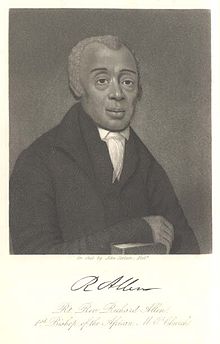In 1786 Richard Allen became a preacher at St. George’s Methodist Episcopal Church in Philadelphia. This congregation was a mixed congregation, consisting of both black and white members. Though Allen was restricted to preaching in the early morning services (as early as 5:00AM), he began to attract a sizable congregation of black worshipers.
In 1787 the black members of St. George’s Methodist Episcopal were surprised to be informed they could no longer sit on the benches they used for years. They were ordered to begin sitting in the balcony. Recognizing they had little choice most of the black members complied.
One member, Absalom Jones, (himself a preacher) refused to move. During the opening prayer that morning a white usher requested that he move immediately. Jones requested to be allowed to remain on his knees until the prayer was finished. Instead, the usher called over another who lifted Jones—a dignified man in his 40s—from his knees and carried him out during the prayer. In protest the black members stood and walked out of the church as one group.
In 1794 Richard Allen planted Bethel African Methodist Episcopal Church in Philadelphia. Over the years white Methodists would insist on varying levels of control over this all-black congregation. Though they built their building with their own funds the white Methodists claimed ownership of the property.
Other congregations who were struggling with their own autonomy sent delegates to a conference in Philadelphia in April, 1816. This group formed the African Methodist Episcopal Church and elected Richard Allen to be their first bishop. This fledgling denomination consisted of five local churches.
By 1865 these five churches had multiplied to 227, with very limited resources (including educated pastors!). These churches were scattered from New Orleans to Ontario and from California to Massachusetts. By 1880 membership in the A.M.E. Church had reached 400,000.
Despite his limited education and the array of forces working against him (Allen battled white opposition his entire life), God used this man in incredible ways. Though he was tireless in his work of planting churches and organizing the A.M.E. Church, Allen was forced to be bivocational. The church committed to paying him a salary of $500 per year. Over 35 years he received a total of $80.
Even with this lack of income from his church, Allen’s business acumen with his boot and shoe store was well-displayed at his death. His estate was worth between $30,000 and $40,000 and included multiple rental properties. This was a staggering sum in 1831.
Today the African Methodist Episcopal Church consists of thousands of churches and millions of members. There are active congregations in 39 countries on five continents.
Praise God for Richard Allen’s courage, hard work, faithfulness to God’s calling. Millions are in the kingdom of God due to his tireless efforts planting new churches, despite tremendous odds.

